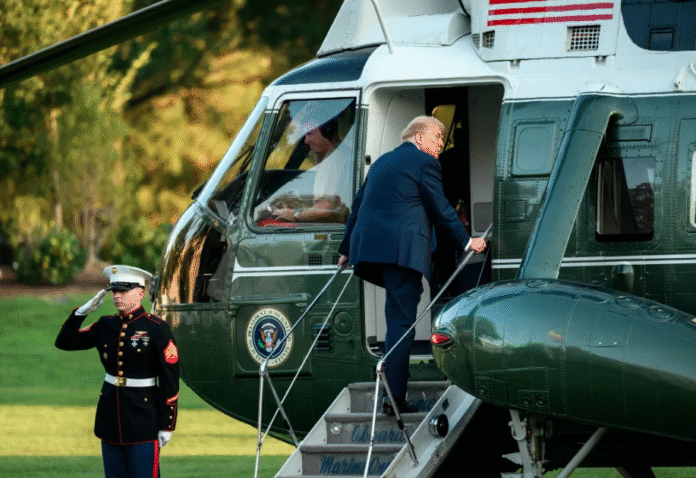U.S President Donald Trump triggered a political firestorm in Colombia after announcing on Truth Social the immediate suspension of all financial aid and imposition of punitive tariffs on Colombian exports, and branding President Gustavo Petro an “illegal drug leader.” The extraordinary statements mark one of the lowest points in 200 years of bilateral relations, and which for decades has depended on security cooperation and shared strategic interests.
Writing from Mar-a-Lago on Sunday, Trump accused Petro of “strongly encouraging the massive production of drugs,” calling narcotics “the biggest business in Colombia, by far.” Trump also issued a stark warning to Bogotá, stating that Petro “better close up these killing fields immediately, or the United States will close them up for him.” He also referred to the Colombian leader as “low rated and very unpopular” with “a fresh mouth toward America.”
The move drew immediate and sharply polarized reactions across Colombia’s political spectrum, beginning with President Petro’s own response.
President Petro issued a lengthy statement mixing literary reference, political ideology, and moral indignation. “Mr. Trump, Colombia has never been rude to the USA; on the contrary, it has greatly admired its culture. But you are rude and ignorant toward Colombia,” Petro said, urging the U.S. president to read Gabriel García Márquez’s One Hundred Years of Solitude. He rejected Trump’s accusations of criminality, calling himself “a socialist, a lover of life,” and contrasting his values with what he described as Trump’s mercantile greed. “A mafioso is a human being who embodies the best of capitalism: greed, and I am the opposite, a lover of life and therefore a millennial warrior for life,” Petro declared.
The reaction from Colombia’s opposition was swift and severe. Former president Álvaro Uribe Vélez, whose security policies underpinned U.S.-Colombia cooperation, issued one of the lengthiest statements, blaming Petro’s policies for the crisis. “Our nation faces a profound internal problem. The growing dominance of the illicit economy is destroying our youth, our families, our democracy, and our nation itself,” Uribe wrote. He argued that cocaine production, which he estimated at more than 1,800 tons annually, had triggered an inevitable international backlash. “The good results previously achieved were lost – results made possible in part by the 11 billion dollars contributed by the United States through Plan Colombia – resources that were ultimately wasted,” he said, calling for a political realignment to restore ties with Washington.
Former president Iván Duque struck a more diplomatic tone, urging dialogue but condemning Petro’s recent rhetoric during a trip to the UN General Assembly in New York. “Nothing is more undignified for a Head of State than to go out onto a street in New York to insult the President of the United States and incite a military rebellion with the purpose of destabilizing his government,” Duque said. “Dialogue and common sense must prevail over shouting and aggression, especially when respect is demanded without having offered it.”
Former Bogotá mayor Claudia López called for respect and institutional defense, saying, “Disagreements between our countries must be resolved with a democratic and cooperative spirit, not with insults or threats. Here we decide at the ballot box: we will defend the institutional framework and, democratically, defeat Petro’s project.”
From the right, Senator María Fernanda Cabal lamented the economic consequences of Trump’s decision. “These sanctions hits the worker, the entrepreneur, the farmer. Not the regime,” she said, adding that the problem was “not with the Colombian people, but with a government that has impoverished the country and isolated it from the world.”
On the government’s side, presidential hopeful Gustavo Bolívar defended Petro’s record against drug trafficking, citing seizures of nearly 2,800 tons of cocaine, 500 extraditions, and the destruction of more than 3,000 laboratories in three years. “Labeling him as Narco is to ignore the effort and the cost in lives that our armed forces have paid under the command of their Commander in Chief, President Petro,” Bolívar argued.
A joint statement from Senator David Luna and former Finance Minister Mauricio Cárdenas, both presidential candidates, urged Trump to distinguish between Petro and Colombia. “We urge you not to respond to the provocations of Gustavo Petro. He is an unpopular president who does not represent the interests of the majority of the Colombian people,” they wrote, warning that tariffs and aid cuts would hurt Colombian workers and give Petro “a pretext to portray himself as a victim.”
The Centro Democrático party, founded by Uribe, issued an institutional response calling the U.S. aid withdrawal “a hard blow to the entire country’s economy” and blaming Petro’s “erratic management” and “Total Peace” policy. “Colombia is going through a national tragedy: the country is flooded with cocaine, the engine of violence and crime,” the statement said, demanding a return to “a true security and illicit crop eradication policy” and warning that Colombia risked drifting toward “authoritarian regimes like those of Venezuela, Cuba, and Nicaragua.”
On Monday, Colombia recalled Ambassador Daniel García-Peña from Washington following Trump’s announcement. “Daniel García-Peña, Ambassador of Colombia in the United States of America, has been recalled for consultations by President Gustavo Petro and is now in Bogotá,” the Foreign Ministry said. “In the coming hours the national government will inform of the decisions taken.”
Colombia currently pays 10% tariffs on most imports to the United States, the baseline level Trump has imposed on many countries.

